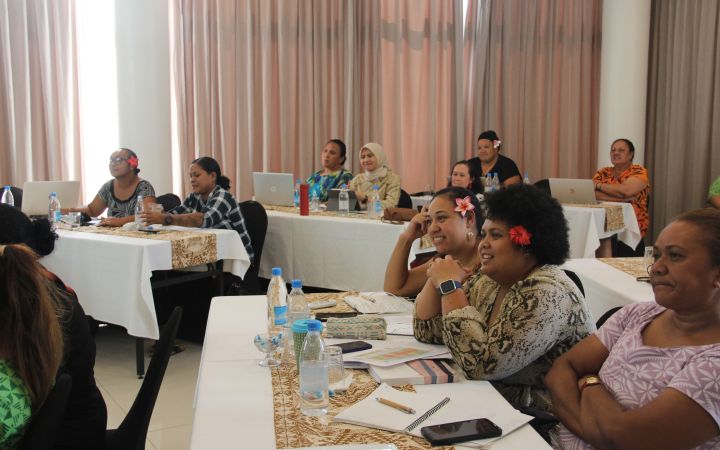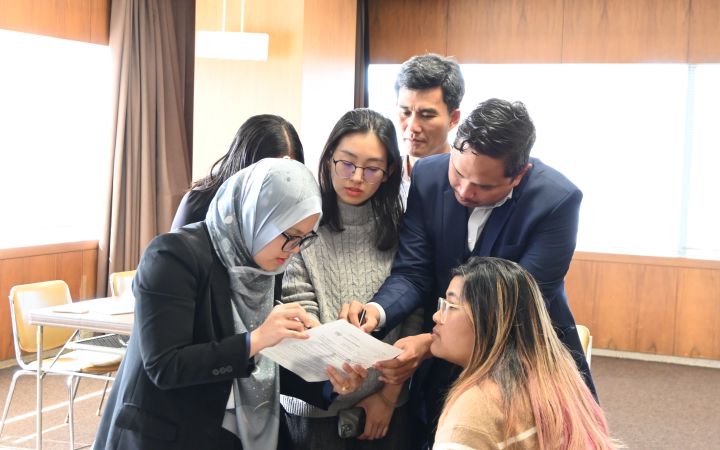- UNITAR invites participants from Asia and Pacific Island countries to apply to the "Leaders for a Free and Open Indo-Pacific: Sea and Human Security" training programme.
- The training is for participants to enhance their knowledge and skills in sea and human security and leadership.
- The training programme is free of charge and financially supported by the Government and People of Japan.
- The deadline for the application is on 7 June 2024.
15 May 2024, Hiroshima, Japan - UNITAR is accepting applications to its training programme "Leaders for a Free and Open Indo-Pacific: Sea and Human Security". The programme is open to motivated government officials and others from the private sector and civil society organizations from Asian and Pacific Island countries. Applicants must be keen to learn how to enhance climate, social, economic, food and maritime security in the region and apply what they learn to make a positive impact on their countries and communities. The programme is scheduled to start on 21 June 2024. The application deadline is 7 June 2024 (midnight, JST/UTC+9).
The programme will be delivered in English and the participants will receive a UNITAR certificate of completion if they complete the course and meet all requirements.
The programme is free for participants and will be run by the UNITAR Division for Prosperity with financial support from the Government and the People of Japan. This programme is part of UNITAR's new initiative, "Shimanami Collective: Capacity Building for Asian and Pacific Island Countries", which will be a series of training programmes to build resilience against disasters and to enhance sea and human security.
learning objectives
"Leaders for a Free and Open Indo-Pacific: Sea and Human Security" aims to provide participants with the necessary skills, knowledge and capacity to enhance climate, social, economic, food and maritime security and establish a coordination mechanism across the Pacific. By the end of the programme, participants will develop and refine policy briefs and individual action plans that address challenges and needs in the Indo-Pacific and enhance regional resilience.
The programme's primary objectives are to:
- enhance basic knowledge of the sea and human security
- promote economic security through trade and access to markets, fisheries and tourism and enhance public and private partnerships
- enhance food and climate security by supporting stable and climate-resilient marine and land food production, effective trading and transportation across the region
- nurture environmental security and maritime cooperation, including regional monitoring and surveillance, disaster response and emergency rescue operations
PHASES OF THE PROGRAMME
- Phase I (June to August 2024): Approximately 400 leaders and government officials from the public and private sectors will enrol in a self-paced online course to study general topics relating to sea and human security. Participants will also join webinars and have access to supplemental resources.
- Phase II (September and October 2024): 160 selected participants will be invited to a regional in-person workshop in Fiji (Pacific cohort) and Indonesia (Asian cohort). Participants will receive mentoring and coaching to refine their projects while enhancing their leadership and teamwork skills.
- Phase III (February 2025): 50 top performers from Phase II will be invited to an in-person workshop in Japan, consisting of study tours, lectures and discussions with Japanese institutions, private companies, and entrepreneurs. The top six teams will be selected as "UNITAR Shimanami Masterminds 2024" and invited to make final pitches at the conference.
*Timing and contents may change
ELIGIBILITY AND HOW TO APPLY
The programme is open to motivated government officials and others from the private sector and civil society organizations, who are:
- eager to learn and apply new knowledge to enhance sea and human security
- keen to succeed and make a positive impact on their countries and communities
- proficient in English
- computer literate, with access to the internet and an electronic device (e.g. computer, tablet or smartphone)
- committed to completing the programme
The countries included in this programme are:
Indo-Pacific Islands Countries: Cook Islands, Federated States of Micronesia, Fiji, Kiribati, Marshall Islands, Nauru, Niue, Palau, Papua New Guinea, Samoa, Solomon Islands, Tonga, Tuvalu, Vanuatu. Asia: Brunei, Cambodia, Indonesia, Lao PDR, Malaysia, Myanmar, Philippines, Singapore, Thailand, Vietnam, Sri Lanka, Timor-Leste.








